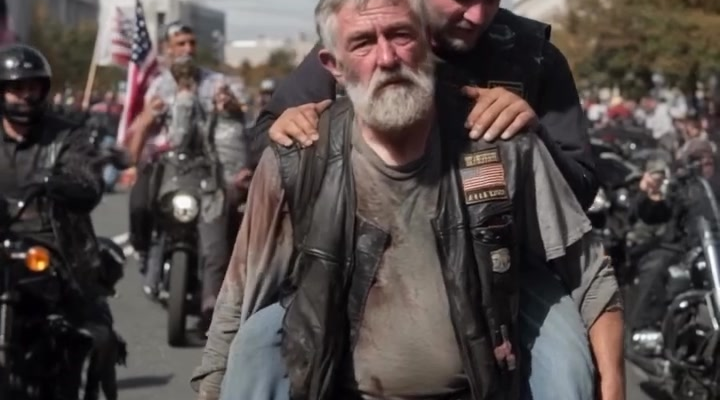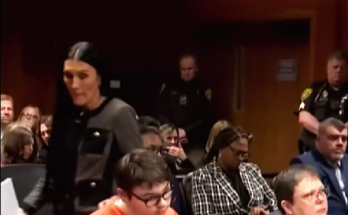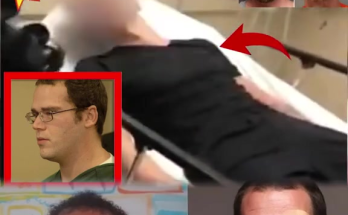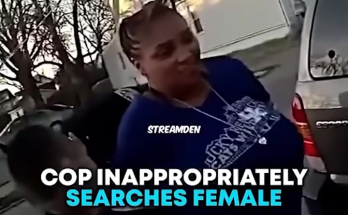Tyler Brooks had dreamed of marching in the Veterans Day parade since he was eight years old. He remembered watching his grandfather lead the World War II contingent down Main Street, pride radiating from every step. That memory stayed with him through the trials of basic training, deployment to Afghanistan, and the long, grueling months of recovery after an IED explosion cost him both legs below the knees.
At twenty-six, Tyler, a Bronze Star and Purple Heart recipient, sat outside City Hall in his wheelchair, holding what should have been a routine request: permission to march in the annual Veterans Day parade—a tradition meant to honor service and sacrifice. Instead, he encountered an unexpected barrier, one that revealed the gap between America’s words and its actions.
“I’m sorry, Mr. Brooks,” the parade coordinator said, barely looking up from her paperwork. “The route isn’t wheelchair accessible. Three miles of historic cobblestone streets, stepped curbs, and narrow sidewalks. Making it accessible would cost the city forty thousand dollars.”
Tyler’s heart sank. “Isn’t there another way? I’ve dreamed of marching in this parade my whole life.”
The coordinator shrugged. “You could ride on a float. Wave to the crowd. Same honor, less… complicated.”
Less complicated. As if Tyler’s desire to walk among his fellow veterans, to feel the weight of tradition and brotherhood, was merely an inconvenience to be managed instead of a right to be honored.
Tyler Brooks didn’t survive an IED blast by accepting defeat easily. If the city wouldn’t help him march, he would find those who would.
Finding Brotherhood in Unexpected Places
The American Legion hall on Oak Street had seen better days. Paint peeled from its walls, and the wooden floors creaked under decades of boots and folding chairs. Yet every Tuesday evening, it hosted something precious: the monthly gathering of the Combat Veterans Motorcycle Club, fifteen men who had found family among chrome and leather when the world seemed to forget their service.
Two weeks before Veterans Day, Tyler wheeled himself into the hall, dressed in crisp uniform, medals polished to a mirror shine. Conversations ceased as heads turned toward him, many recognizing the young veteran from local news coverage.
Jim “Tank” Morrison rose first. Towering at six-foot-three and nearly three hundred pounds, with a long gray beard and arms covered in military tattoos, Tank seemed every bit the motorcycle stereotype—but his voice carried the calm authority of a man who had endured more than his share of pain.
“What can we do for you, son?”
Tyler’s prepared speech evaporated. His voice broke as he explained his simple, yet devastating request: “I just want to march in the Veterans Day parade. Like my grandfather did. Like my father did. Like I should have before…” He gestured at his wheelchair, then straightened his shoulders with effort. “The city says it’s too expensive to make it accessible. They offered me a float instead.”
The room fell silent, but the quiet was heavy with understanding, anger, and a fierce determination.
Buck Williams, the club’s sergeant-at-arms and a Vietnam veteran, spoke first. “A float? They want to put a combat veteran on a parade float like he’s Miss America?”
“That’s what they suggested,” Tyler replied. “The mayor said if I can’t walk the route like everyone else, maybe I shouldn’t participate. Said the parade is about honoring those who served, not making special accommodations.”
Tank approached Tyler’s wheelchair. “Stand up, son.”
Tyler hesitated. “I can’t—”
“I said stand up.”
Realization dawned. Tank squatted, his massive frame surprisingly agile despite decades of injuries. “Get on my back.”
“You can’t carry me for three miles,” Tyler protested.
“My knees survived the Tet Offensive and forty years of labor. They’ll survive carrying a brother who deserves to march,” Tank said.
Tyler wrapped his arms around Tank’s neck as the room erupted in cheers.
“We’ll take turns,” Buck suggested, thinking practically.
Tank shook his head. “No. He wants to march. I’ll carry him the entire way.”
Word Spreads, Battle Lines Form
News of the plan spread quickly through the veteran community. Social media, phone calls, and conversations in VFW halls and Legion posts buzzed with the story: the city refused to accommodate a wounded veteran, so a group of motorcycle-riding veterans decided to carry him the entire parade route.
Support and controversy erupted in equal measure. Veterans and military families rallied behind Tyler and Tank, sharing stories of bureaucratic indifference. City officials and parade organizers fretted over liability and precedent.
Mayor Richardson, a politician with no real military experience, called Tank three days before the parade.
“Mr. Morrison, I understand you’re planning some kind of demonstration for the parade,” he said.
Tank’s voice was calm, deliberate. “Demonstration? No. We’re helping a brother veteran march and honor our fallen.”
“It will disrupt the parade and attract media attention,” the mayor warned.
“Every veteran IS one person,” Tank said. “One who raised his hand, one who came home broken, one who deserves to march.”
The mayor threatened to remove the club from the parade. Tank laughed, not a chuckle but a challenge: “Remove combat veterans and explain to the public why wounded warriors aren’t welcome at events held in their honor.”
The line went dead.
The Morning That Changed Everything
November 11th arrived cold and crisp. Tyler rolled into the staging area in full dress uniform, medals catching the morning light. Tank and the Combat Veterans MC were ready, leather vests adorned with patches telling stories of distant wars and hard-won brotherhood.
Patricia Hawkins, the parade coordinator, approached nervously. “The mayor says—”
Tank interrupted. “We’re marching. This young man is marching. End of discussion.”
Other veteran groups watched—Korean War vets, Gulf War vets, Iraq and Afghanistan vets, even some in their nineties—witnessing something extraordinary.
Tank squatted beside Tyler. “Ready, son?”
Tyler nodded, tears forming. Tank lifted him onto his back, the room erupting in applause. Soon, over fifty veterans volunteered to help carry Tyler, but Tank insisted on doing it himself.
The March That Moved a Nation
The parade began with high school bands, civic groups, and floats. When the veteran contingent appeared, led by Tank carrying Tyler and surrounded by a formation of fifty veterans, the crowd’s reaction was immediate: gasps, silence, then thunderous applause. Phones recorded and streamed the scene live. Children saluted. Veterans stood with tears in their eyes.
Tank’s knees screamed after half a mile, old injuries protesting every step. Tyler whispered, “Look at all these people—they’re saluting us.”
“They’re saluting what you represent, son,” Tank replied. “The cost of freedom, the willingness to pay without asking what’s in it for them.”
Confrontation at the Reviewing Stand
At two miles, Mayor Richardson confronted them. “This ends now. You’re turning my parade into a circus act.”
Tank stopped, Tyler secure on his back, and faced him. “Your parade? This young man lost his legs serving our country. You said he couldn’t march because the city wouldn’t spend forty thousand dollars. You said if he can’t walk, maybe he shouldn’t participate.”
The crowd fell silent. Tyler’s voice carried with moral clarity: “You mean wounded veterans aren’t worth forty thousand dollars?”
Shouts of “Shame!” rose from the crowd, turning into a chant that echoed along Main Street. Live streams spread the story nationwide.
When Heroes Fall and Communities Rise
At two and a half miles, Tank’s body gave out. He went to one knee, Tyler still on his back. Civilians surged forward, creating a human support system that helped carry both men forward. Teenagers, elderly citizens, and middle-aged volunteers joined in, showing what community support could look like when compassion outweighed bureaucracy.
The Finish Line That Started Everything
The final half mile became a pilgrimage. Civilians walked alongside the veteran duo, helping them cross the finish line at Memorial Park. Tank collapsed, refusing medical help, while Tyler rolled beside him, tears streaming.
“We made it, son,” Tank whispered. “We proved the point.”
Tyler sobbed. “You could have hurt yourself. Why did you risk it?”
“Because twenty-two veterans commit suicide daily, partly from feeling forgotten,” Tank said. “We carry each other—that’s what brothers do.”
The video went viral. #CarryThemAll became a national movement, sparking conversations about accessibility and veterans’ care.
The Aftermath That Changed Everything
Mayor Richardson’s political career ended within weeks. More importantly, Tyler’s dream sparked legislative change: the Veterans Parade Accessibility Act mandated that federally funded parades be fully wheelchair accessible. Cities invested in permanent accessibility, local businesses prioritized veteran hiring, and schools paired students with disabled veterans to ensure inclusion.
The Legacy of One Stubborn Biker
Tank never fully recovered. His knees required surgery and permanent braces. But his sacrifice proved that words honoring veterans mean nothing without action.

The Combat Veterans MC grew to over two hundred members across twelve states, actively supporting wounded warriors. Tyler now marches every year on prosthetic legs, sharing his story to inspire others.
Tank keeps a photo on his Harley-Davidson, the moment immortalized: him on his knees, Tyler on his back, surrounded by civilians. Below, written in permanent marker: “The day America remembered what ‘leave no one behind’ actually means.”
A Nation’s Reminder
This story is not just about one biker carrying one veteran for three miles—it’s a lesson in translating respect for service into meaningful action. Accessibility is a right, not a favor. True brotherhood is shown in willingness to carry someone else’s burden.
The Combat Veterans Motorcycle Club’s motto says it all: “We carry each other, because that’s what brothers do.”
Tank Morrison and Tyler Brooks reminded the nation that real acts of patriotism often happen on streets filled with ordinary people, proving that promises made to veterans must be kept—not just in words, but in deeds.



